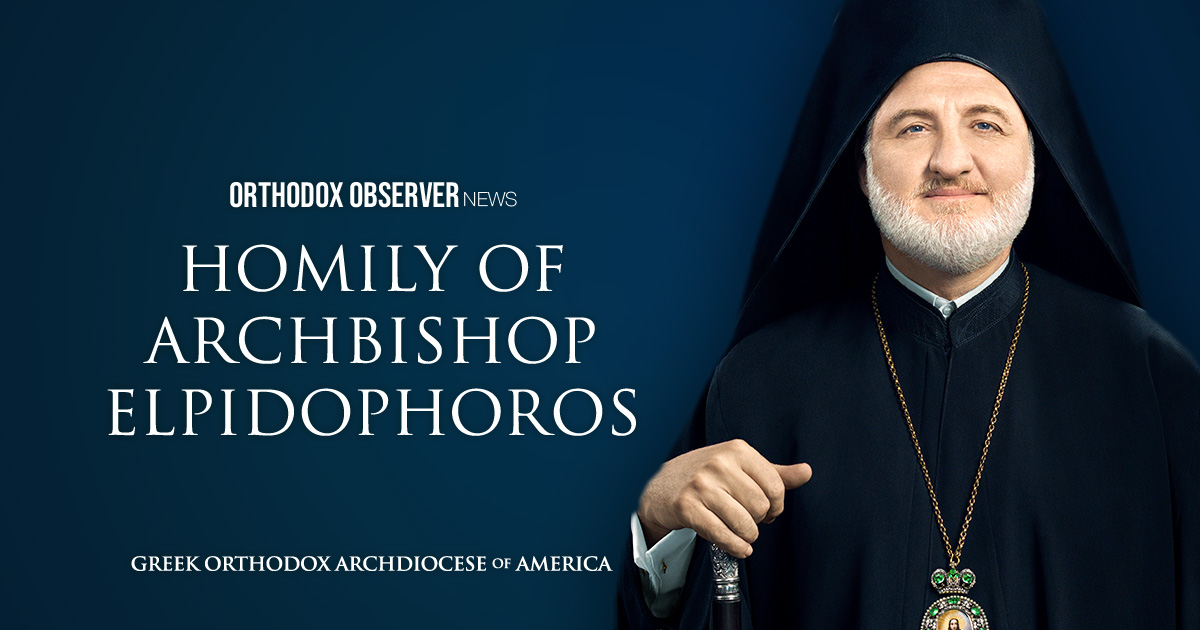His Eminence Archbishop Elpidophoros of America
Homily at the Service of the Akathist Hymn
Saint Katherine Greek Orthodox Church
Falls Church, VA
April 16, 2021
Beloved Brothers and Sisters in Christ,
Tonight we gather to make our supplications known to the Mother of God, the greatest defender of Christians. We sing this magnificent canticle – the Akathist Hymn – in praise of our Παναγία, our Celestial Champion.
Tonight, we join with Orthodox Christians around our Nation and around the world as we chant:
Τῇ ὑπερμάχῷ στρατηγῷ τὰ νικητήρια,
ὡς λυτρωθεῖσα τῶν δεινῶν εὐχαριστήρια,
ἀναγράφω σοι ἡ πόλις σου, Θεοτόκε·
ἀλλ' ὡς ἔχουσα τὸ κράτος ἀπροσμάχητον,
ἐκ παντοίων με κινδύνων ἐλευθέρωσον,
ἵνα κράζω σοί· Χαῖρε Νύμφη ἀνύμφευτε.
* * *
To You the Champion, we your City dedicate a feast of victory and thanksgiving, as ones rescued out of sufferings, O Theotokos. But as you are one with might that is invincible, that can deliver us from all dangers, that we may cry to you: Rejoice, Bride unwedded!
This special Hymn, that in so many ways is the spiritual National Anthem for all Greek People, was first chanted in the year 626 AD, seventy years after the repose of Saint Romanos the Melodist. It was Saint Romanos the Deacon, who served in Hagia Sophia; who was the composer of the full Kontakion that we chanted this evening.
In that year of 626 AD, Constantinople was besieged by Avars from the Caucasus region, and by Persians, who meant to sack and plunder The Queen of Cities. The then Patriarch Sergios, wanting to inspire the City’s defenders, processed all around the walls, holding the Icon of Panagia Vlachernitissa. That same night, a great storm suddenly arose and destroyed the enemy fleet, such that the invaders were forced to retreat. When the daybreak came, their victory was manifest, much like it was made known “by the dawn’s early light,” that we sing of in our American National Anthem.
The people of Constantinople saw this as the direct intervention of the Theotokos. And in thanksgiving, they stood all night chanting in the Church of Hagia Sophia – hence, the name: Akathyst Hymn. On this blessed occasion, then, is when Τῇ Ὑπερμάχῷ was chanted for the first time.
My beloved Christians:
How many time have these sacred verses been repeated throughout the centuries! Again and again – Ἔτι καὶ ἔτι – as we chant in our liturgies.
Yet, my dear people of God, we can never utter these prayers and praises enough.
For our best weapons in this life – and, indeed, our only true and efficacious weapons – are the cries of our hearts to God.
It is through our supplications, our thanksgivings, our petitions and our laudations that we draw near to God. God is always near to us, but we must find our way to Him.
Through the prayers of the Church, and through our personal petitions to Heaven, we are brought to the consciousness of God in our moments of crisis.
This past year seems to have been one continual crisis, and it is through these services, and through your own personal acts of devotion, that you can be refreshed by divine consolation.
Therefore, let us take this opportunity tonight, and especially in the coming days of Holy Week, to arm ourselves with this weapon of prayer. And as the Apostle says, let us “draw near with confidence to the throne of grace, that we may receive mercy and find grace to help in time of need.” [*]
On this Throne is seated the Son of God, Who listens to His Holy Mother, as she entreats Him for our sake. And she is Κεχαριτωμένη – filled with every grace, as the Archangel Gabriel hailed her. [†]
Through the her holy intercessions, may we attain to the Holy Passion and Glorious Resurrection of her Son, our Lord Jesus Christ, Who is praised and glorified with His Father and the Holy Spirit, now and ever, and unto the ages of ages. Amen.

